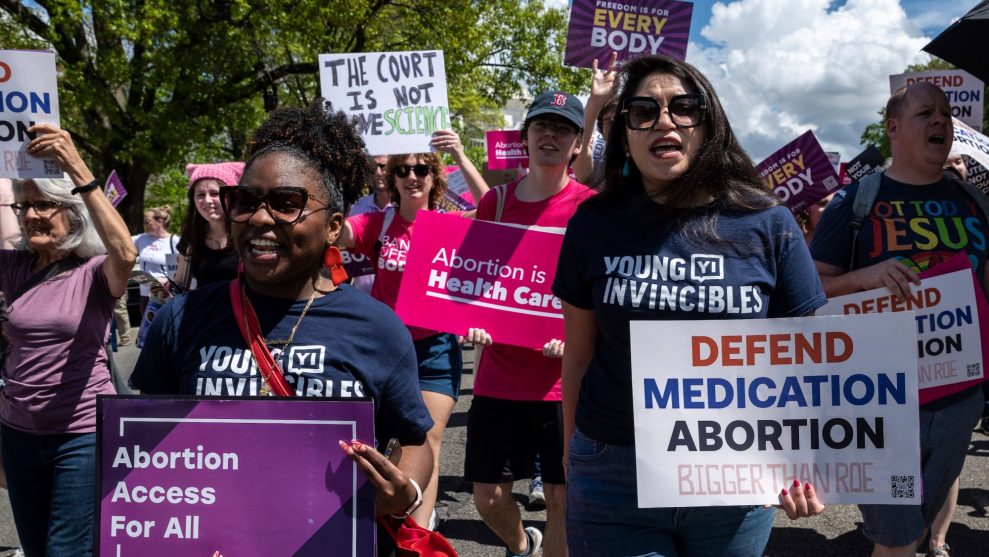
A new study refutes some of the arguments that are the basis of a forthcoming Supreme Court case seeking to restrict access to abortion pills.Alejandro Alvarez/Sipa USA/AP
A key argument from anti-abortion activists bringing a case to the Supreme Court is that medication abortion—which accounts for more than half of all abortions nationwide, according to the Guttmacher Institute—is unsafe and ineffective.
A new study provides even more evidence that this is not true and that medication abortion is just as safe when it’s prescribed virtually as in person. Published Thursday in the journal Nature Medicine, the study examined more than 6,000 medication abortions that people from 20 states and Washington, D.C. obtained from three virtual clinics between April 2021 and January 2022. Researchers found that about 98 percent of them were effective in terminating pregnancies without any additional interventions and that 99.8 percent were safe and “not followed by serious adverse events.”
The paper comes at a crucial time. Next month, the Supreme Court is slated to hear oral arguments in a case arguing against the FDA approval of mifepristone, the first of the two pills taken in a medication abortion. It has been billed as the biggest abortion case since Dobbs. The Supreme Court case traces back to a 2022 complaint, filed by the Alliance Defending Freedom on behalf of four doctors and several anti-abortion medical organizations, that centered on the Comstock Law, an 1873 federal statute that prohibits the mailing of “obscene, lewd, or lascivious” material. At issue in the Supreme Court case is whether the FDA acted improperly in 2016 and 2021 when the agency relaxed some rules around how mifepristone can be prescribed.
If the court restricts the accessibility of mifepristone through telehealth, it could have a significant effect. With abortion restrictions on the rise, obtaining abortion pills from virtual clinics has continued to grow in popularity. After the Supreme Court handed down the Dobbs decision in June 2022, abortions obtained through telehealth increased drastically—from 3,610 in April 2022 to 8,540 by December of that year, according to research published last year by the Society of Family Planning. And as I reported last month, a study published in the journal JAMA Internal Medicine shows that more Americans are using telehealth to stockpile abortion pills in case they need them in the future.
As the New York Times reported last year, more than 100 studies have already established the safety and effectiveness of abortion pills. But the new paper, from Ushma Upadhyay at the University of California, San Francisco, stands out for its focus on telehealth abortion and its large sample size, according to Dana Johnson, senior associate research scientist at Ibis Reproductive Health, who was not involved with the research.
The publication of Upadhyay’s latest study follows the retractions of two studies that are cited in the forthcoming Supreme Court case and claim to show the dangers of mifepristone. The studies were pulled after an independent peer review uncovered unsupported conclusions due to flaws with the study design, methodology, and data analysis—along with possible conflicts of interest given the lead author’s affiliation with the Charlotte Lozier Institute, an anti-abortion advocacy organization, the Associated Press reported. (The lead author, James Studnicki, a vice president at the Lozier Institute, said in an emailed statement to the AP that the retractions constituted a “baseless attack on our scientific research and studies.”)
Upadhyay told me she doesn’t see her study as a rebuttal to the recently retracted ones. But she is concerned that the Supreme Court could uphold the FDA’s 2016 update—which expanded the use of medication abortion from 49 to 70 days gestation and allowed more medical professionals to provide patients with the pills—while still ruling that the FDA was wrong to allow the pills to be provided by mail in 2021. The removal of the in-person dispensing requirement, prompted by the pandemic, “made a huge impact on access,” she said.
Johnson, the independent expert from Ibis Reproductive Health, said the stakes of the forthcoming case make this new research all the more significant. “Ahead of the Supreme Court case,” she said, “it’s incredibly important to look to valid studies and research that has reaffirmed, time and time again, that mifepristone is incredibly safe and effective when used for abortion.”















